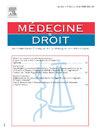Déprescription et responsabilité médicale
IF 0.1
Q4 MEDICINE, LEGAL
引用次数: 0
Abstract
Deprescribing aim to improve the clinical condition of patients, through progressively reducing and/or discontinuing certain drug treatments. This paper reports its conceptual genesis and gradual diffusion, the dynamics of practitioners/healthcare insurer agreements in France, and medical liability. Irrespective of any incentive agreement, consideration of the advisability of de-prescribing has become mandatory in situations where iatrogenic risks are well established – particularly in the case of multi-medication treatments: as knowledge grows, failure to deprescribe (or to consider the advisability of doing so) could be considered a fault. However, de-prescribing is not a quantitative approach, due to its clinical purpose and consequences: it requires gathering scattered data, prioritizing treatments, planning, and sometimes arbitrating between therapeutic intentions. Interprofessional collaboration is then served by new tools and informed by experience-sharing: they alone can meet the clinical and societal challenge of deprescribing, while dedicated algorithms and AI are coming.
处方和医疗责任
开处方的目的是通过逐步减少和/或停止某些药物治疗来改善患者的临床状况。本文报告其概念的起源和逐渐扩散,从业者/医疗保险协议在法国的动态,和医疗责任。无论是否有任何激励协议,在医源性风险已经确定的情况下,特别是在多种药物治疗的情况下,考虑取消处方的可取性已经成为强制性的:随着知识的增长,未能取消处方(或考虑这样做的可取性)可能被视为过失。然而,由于其临床目的和后果,取消处方并不是一种定量方法:它需要收集分散的数据,确定治疗的优先顺序,制定计划,有时还需要在治疗意图之间进行仲裁。然后,新工具为跨专业合作提供了服务,并通过经验分享提供了信息:仅凭它们就可以应对处方的临床和社会挑战,而专用算法和人工智能即将到来。
本文章由计算机程序翻译,如有差异,请以英文原文为准。
求助全文
约1分钟内获得全文
求助全文
来源期刊

Medecine & Droit
MEDICINE, LEGAL-
CiteScore
0.30
自引率
0.00%
发文量
27
期刊介绍:
The Scientific Committee of the journal Médecine et Droit includes professors of medicine, professors of law, magistrates, lawyers, court medical experts, and specialists in compensation for physical injury. Médecine et Droit provides: • rigorous and clear support for informative and educational matter • a tool for reflection and actualisation of knowledge • an essential link between doctors and lawyers. Médecine et Droit informs: • doctors on different aspects of law and regulations encountered in their profession • lawyers on the specific problems of the medical profession and important bio-ethical issues
 求助内容:
求助内容: 应助结果提醒方式:
应助结果提醒方式:


